formerly eScholarship Editions


|
|
|
|
Your request for similar items found 20 book(s). | Modify Search | Displaying 1 - 20 of 20 book(s) | |
| 1. | 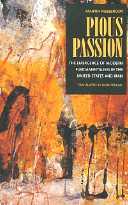 | Title: Pious passion: the emergence of modern fundamentalism in the United States and Iran Author: Riesebrodt, Martin Published: University of California Press, 1993 Subjects: Religion | Sociology | Social Theory | Middle Eastern Studies | American Studies | United States History Publisher's Description: Martin Riesebrodt's unconventional study provides an extraordinary look at religious fundamentalism. Comparing two seemingly disparate movements - in early twentieth-century United States and 1960s and 1970s Iran - he examines why these movements arose and developed. He sees them not simply as protests against "modernity" per se, but as a social and moral community's mobilization against its own marginalization and threats to its way of life. These movements protested against the hallmarks of industrialization and sought to transmit conservative cultural models to the next generation.Fundamentalists desired a return to an "authentic" social order governed by God's law, one bound by patriarchal structures of authority and morality. Both movements advocated a strict gender dualism and were preoccupied with controlling the female body, which was viewed as the major threat to public morality. [brief] Similar Items |
| 2. | 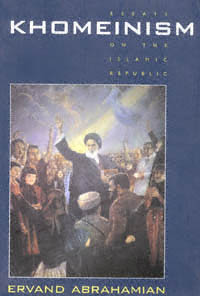 | Title: Khomeinism: essays on the Islamic Republic Author: Abrahamian, Ervand 1940- Published: University of California Press, 1993 Subjects: History | Politics | Middle Eastern History | Middle Eastern Studies Publisher's Description: "Fanatic," "dogmatic," "fundamentalist" - these are the words most often used in the West to describe the Ayatollah Khomeini. The essays in this book challenge that view, arguing that Khomeini and his Islamic movement should be seen as a form of Third World political populism - a radical but pragmatic middle-class movement that strives to enter, rather than reject, the modern age.Ervand Abrahamian, while critical of Khomeini, asks us to look directly at the Ayatollah's own works and to understand what they meant to his principal audience - his followers in Iran. Abrahamian analyzes political tracts dating back to 1943, along with Khomeini's theological writings and his many public statements in the form of speeches, interviews, proclamations and fatwas (judicial decrees). What emerges, according to Abrahamian, is a militant, sometimes contradictory, political ideology that focuses not on issues of scripture and theology but on the immediate political, social, and economic grievances of workers and the middle class.These essays reveal how the Islamic Republic has systematically manipulated history through televised "recantations," newspapers, school textbooks, and even postage stamps. All are designed to bolster the clergy's reputation as champions of the downtrodden and as defenders against foreign powers. Abrahamian also discusses the paranoia that permeates the political spectrum in Iran, contending that such deep distrust is symptomatic of populist regimes everywhere. [brief] Similar Items |
| 3. | 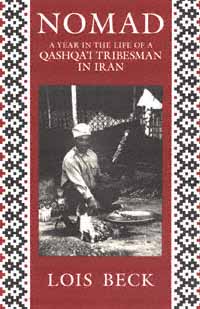 | Title: Nomad: a year in the life of a Qashqa'i tribesman in Iran Author: Beck, Lois 1944- Published: University of California Press, 1991 Subjects: Anthropology | Cultural Anthropology | Middle Eastern Studies | Middle Eastern History Publisher's Description: Borzu Qermezi was the headman and political leader of a group of nomadic pastoralists who were part of the Qashqa'i confederacy of southwest Iran. Proud, complex, strong-willed, witty, and cunning, Borzu successfully led his people on their annual migrations for many years. He regulated their travel; mediated conflicts; intervened in (and sometimes exacerbated) tense situations between his people and other nomads; and dealt with the government police agency. Structuring the account around the four seasons, Lois Beck recounts the day-to-day activities of Borzu during the year she spent traveling with his people. She describes the rigors of nomadic life and the consequences of decisions made in haste.During 1970 to 1971, Borzu and his people were faced with many difficulties. When the expected winter rains did not fall, pastures and crops shriveled. Unable to sell their starving livestock for any profit, Borzu's people saw their debts to urban merchants and moneylenders increase. At the same time, Iran exercised more bureaucratic control over the Qashqa'i by applying new policies over migratory schedules and the allocation of scarce pastures, and by introducing non-Qashqa'i agriculturalists and livestock investors as legitimate land users. All these measures threatened the nomad's way of life and eventually undermined the role of headmen such as Borzu. Lois Beck details the vicissitudes endured by Borzu's people and the strategies he devised to cope with them.Blending ethnographic and historical material, this book contains information unavailable for other tribal and nomadic pastoral groups in the Middle East and central Asia. Through Beck's deft analysis, we come to understand why nomadic pastoralism was once an important part of this vast region, and why tribal society has endured. [brief] Similar Items |
| 4. | 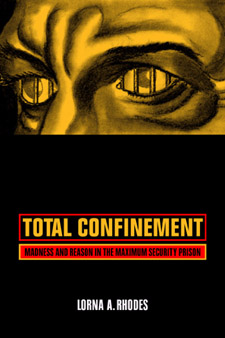 | Title: Total confinement: madness and reason in the maximum security prison Author: Rhodes, Lorna A. (Lorna Amarasingham) Published: University of California Press, 2004 Subjects: American Studies | Anthropology | Cultural Anthropology | Medical Anthropology | Ethnic Studies | Gender Studies | Medicine | Politics | Sociology Publisher's Description: In this rare firsthand account, Lorna Rhodes takes us into a hidden world that lies at the heart of the maximum security prison. Focusing on the "supermaximums" - and the mental health units that complement them - Rhodes conveys the internal contradictions of a system mandated to both punish and treat. Her often harrowing, sometimes poignant, exploration of maximum security confinement includes vivid testimony from prisoners and prison workers, describes routines and practices inside prison walls, and takes a hard look at the prison industry. More than an exposé, Total Confinement is a theoretically sophisticated meditation on what incarceration tells us about who we are as a society. Rhodes tackles difficult questions about the extreme conditions of confinement, the treatment of the mentally ill in prisons, and an ever-advancing technology of isolation and surveillance. Using her superb interview skills and powers of observation, she documents how prisoners, workers, and administrators all struggle to retain dignity and a sense of self within maximum security institutions. In settings that place in question the very humanity of those who live and work in them, Rhodes discovers complex interactions - from the violent to the tender - among prisoners and staff. Total Confinement offers an indispensable close-up of the implications of our dependence on prisons to solve long-standing problems of crime and injustice in the United States. [brief] Similar Items |
| 5. | 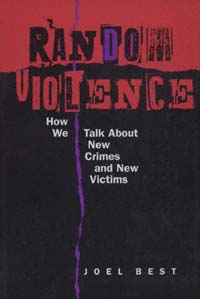 | Title: Random violence: how we talk about new crimes and new victims Author: Best, Joel Published: University of California Press, 1999 Subjects: Sociology | Social Problems | Law | Criminology Publisher's Description: Random Violence is a deft and thought-provoking exploration of the ways we talk about - and why we worry about - new crimes and new forms of victimization. Focusing on so-called random crimes such as freeway shootings, gang violence, hate crimes, stalking, and wilding, Joel Best shows how new crime problems emerge and how some quickly fade from public attention while others spread and become enduring subjects of concern. Best's original and incisive argument illuminates the fact that while these crimes are in actuality neither new, nor epidemic, nor random, the language used to describe them nonetheless shapes both private fears and public policies.Best scrutinizes the melodramatic quality of the American public's attitudes toward crime, exposing the cultural context for the popularity of "random violence" as a catch-all phrase to describe contemporary crime, and the fallacious belief that violence is steadily rising. He points out that the age, race, and sex of homicide victims reveal that violence is highly patterned.Best also details the contemporary ideology of victimization, as well as the social arrangements that create and support a victim industry that can label large numbers of victims. He demonstrates why it has become commonplace to "declare war" on social problems, including drugs, crime, poverty, and cancer, and outlines the complementary influence of media, activists, officials, and experts in institutionalizing crime problems. Intrinsic to all these concerns is the way in which policy choices and outcomes are affected by the language used to describe social problems. [brief] Similar Items |
| 6. | 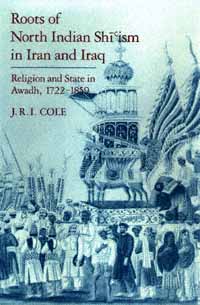 | Title: Roots of North Indian Shīʿism in Iran and Iraq: religion and state in Awadh, 1722-1859 Author: Cole, Juan Ricardo Published: University of California Press, 1989 Subjects: Asian Studies Publisher's Description: In this pioneering study of the Twelver Shi'i branch of Islam prevalent in Iraq and Iran, J. R. I. Cole traces the influence of Shi'i rule on the development of religious communalism and conflict in the North Indian State of Awadh (Oudh). He also examines the relationship of the Shi'i clergy to the state and the clerical reaction to British imperialism and capitalism.Based on research in rare manuscripts and in archives, the book reveals that the Shi'i clergy advocated policies that caused resentment among Sunnis and Hindus, thereby promoting religious communalism and setting the stage for modern communal conflict. The Shi'i learned men took government posts in support of Awadh's Shi'i nawabs and shahs; Awadh state support, in turn, helped transform Shi'ism from a persecuted "sect" to a dominant, if still minority, religious establishment.Sociologically, the book draws attention to the specific role of the state in defining "sect" and "church." It also argues the importance of class divisions within the Shi'i community, showing that the dominant clerical ideology was often not accepted by the laboring strata. Cole's study supports the view that Muslim communalism in Northern India had genuine historical roots and was not simply an elite strategy of modern Muslim politicians. Contrary to the arguments of some writers and to the image projected by Iran's current ayatullahs, he claims that most Shi'i clergy did not play a role of opposition to the state. [brief] Similar Items |
| 7. |  | Title: The vanishing vision: the inside story of public television Author: Day, James 1918- Published: University of California Press, 1995 Subjects: Media Studies | American Studies | Sociology | Television and Radio | History Publisher's Description: This spirited, first-ever history of public television offers an insider's account of its topsy-turvy, forty-year odyssey. James Day, a founder of San Francisco's KQED and a past president of New York's WNET, chronicles public television's fascinating evolution from its inauspicious roots in the 1950s to its strong, fiercely debated presence in contemporary culture. The Vanishing Vision provides a vivid and often amusing behind-the-screens history. Day tells how a program producer, desperate to locate a family willing to live with television cameras for seven months, borrowed a dime - and a suggestion - from a blind date and telephoned the Louds of Santa Barbara. The result was the mesmerizing twelve-hour documentary, An American Family . Day relates how Big Bird and his friends were created to spice up Sesame Street when test runs showed a flagging interest in the program's "live-action" segments. And he describes how Frieda Hennock, the first woman appointed to the FCC, overpowered the resistance of her male colleagues to lay the foundation for public television.Along the way, Day identifies the particular forces that have shaped public television. The result, in his view, is a Byzantine bureaucracy kept on a leash by an untrusting Congress, with a fragmented leadership that lacks a clearly defined mission in today's multimedia environment. Public television's "democratic" structure of over 300 stations stifles boldness and innovation while absorbing money needed for national programming.Day calls for a bold rethinking of public television's mission, advocating a system that is adequately funded and independent of government, one capable of countering commercial television's "lowest-common-denominator" approach with a full range of substantive programs, comedy as well as culture, entertainment as well as information. [brief] Similar Items |
| 8. |  | Title: Violence workers: police torturers and murderers reconstruct Brazilian atrocities Author: Huggins, Martha Knisely 1944- Published: University of California Press, 2002 Subjects: Anthropology | Latin American Studies | Sociology Publisher's Description: Of the twenty-three Brazilian policemen interviewed in depth for this landmark study, fourteen were direct perpetrators of torture and murder during the three decades that included the 1964-1985 military regime. These "violence workers" and the other group of "atrocity facilitators" who had not, or claimed they had not, participated directly in the violence, help answer questions that haunt today's world: Why and how are ordinary men transformed into state torturers and murderers? How do atrocity perpetrators explain and justify their violence? What is the impact of their murderous deeds - on them, on their victims, and on society? What memories of their atrocities do they admit and which become public history? [brief] Similar Items |
| 9. |  | Title: Pivot of the universe: Nasir al-Din Shah Qajar and the Iranian Monarchy, 1831-1896 Author: Amanat, Abbas Published: University of California Press, 1997 Subjects: History | Middle Eastern History | Middle Eastern Studies | Autobiographies and Biographies Publisher's Description: When he was assassinated in 1896, Nasir al-Din Shah had occupied the Peacock throne for nearly half a century. A colorful, complex figure, he is frequently portrayed as indolent and indulgent. Yet he was in many ways an effective ruler who displayed remarkable resilience in the face of dilemmas and vulnerabilities shared by most monarchs of the Islamic world in the nineteenth century. The Pivot of the Universe is the first biography of this fascinating monarch. In it Amanat traces Nasir al-Din Shah's transformation from an insecure crown prince, and later an erratic boy-king, to a ruler with substantial control over his government and foreign policy. He provides a vivid picture of the political culture that determined Nasir al-Din Shah's behavior and, ultimately, his conception of government: the mode of succession in an urbanizing nomadic dynasty, the complicated relationships of the harem and his family, and the fatherly role of his guardian-ministers.Based on extensive research into public and private papers, illustrated with drawings and photographs from the period, this book offers a fresh interpretation both of the significance of Nasir al-Din Shah and the way in which the Iranian monarchy, the centerpiece of an ancient political order, withstood and adjusted to the challenges of modern times. [brief] Similar Items |
| 10. | 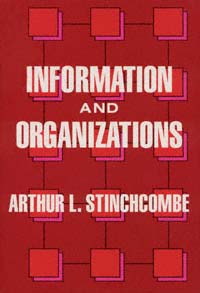 | Title: Information and organizations Author: Stinchcombe, Arthur L Published: University of California Press, 1990 Subjects: Sociology | Economics and Business | Labor Studies | Political Theory Publisher's Description: An ambitious new work by a well-respected sociologist, Information and Organizations provides a bold perspective of the dynamics of organizations. Stinchcombe contends that the "information problem" and the concept of "uncertainty" provide the key to understanding how organizations function. In a delightful mix of large theoretical insights and vivid anecdotal material, Stinchcombe explores the ins and outs of organizations from both a macro and micro perspective. He reinterprets the work of the renowned scholars of business, Alfred Chandler, James March and Oliver Williamson, and looks in depth at corporations like DuPont and General Motors. Along the way, Stinchcombe explores subjects as varied as class consciousness, innovation, contracts and university administration. All of these analyses are distinguished by incisive thinking and creative new approaches to issues that have long confronted business people and those interested in organizational theory.A tour de force, Information and Organizations is a must-read for business people and scholars of many stripes. It promises to be a widely discussed and debated work. [brief] Similar Items |
| 11. |  | Title: American gulag: inside U.S. immigration prisons Author: Dow, Mark Published: University of California Press, 2004 Subjects: Politics | American Studies | Anthropology | Ethnic Studies | Law | Sociology Publisher's Description: Before September 11, 2001, few Americans had heard of immigration detention, but in fact a secret and repressive prison system run by the U.S. Immigration and Naturalization Service has existed in this country for more than two decades. In American Gulag, prisoners, jailers, and whistle-blowing federal officials come forward to describe the frightening reality inside these INS facilities. Journalist Mark Dow's on-the-ground reporting brings to light documented cases of illegal beatings and psychological torment, prolonged detention, racism, and inhumane conditions. Intelligent, impassioned, and unlike anything that has been written on the topic, this gripping work of investigative journalism should be read by all Americans. It is a book that will change the way we see our country. American Gulag takes us inside prisons such as the Krome North Service Processing Center in Miami, the Corrections Corporation of America's Houston Processing Center, and county jails around the country that profit from contracts to hold INS prisoners. It contains disturbing in-depth profiles of detainees, including Emmy Kutesa, a defector from the Ugandan army who was tortured and then escaped to the United States, where he was imprisoned in Queens, and then undertook a hunger strike in protest. To provide a framework for understanding stories like these, Dow gives a brief history of immigration laws and practices in the United States - including the repercussions of September 11 and present-day policies. His book reveals that current immigration detentions are best understood not as a well-intentioned response to terrorism but rather as part of the larger context of INS secrecy and excessive authority. American Gulag exposes the full story of a cruel prison system that is operating today with an astonishing lack of accountability. [brief] Similar Items |
| 12. |  | Title: Prime-time families: television culture in postwar America Author: Taylor, Ella Published: University of California Press, 1989 Subjects: Sociology | United States History | Media Studies | Gender Studies | Television and Radio Similar Items |
| 13. | 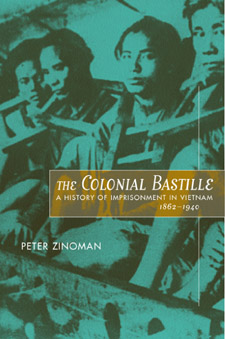 | Title: The colonial Bastille: a history of imprisonment in Vietnam, 1862-1940 Author: Zinoman, Peter 1965- Published: University of California Press, 2001 Subjects: Asian Studies | Asian History | Southeast Asia | Politics Publisher's Description: Peter Zinoman's original and insightful study focuses on the colonial prison system in French Indochina and its role in fostering modern political consciousness among the Vietnamese. Using prison memoirs, newspaper articles, and extensive archival records, Zinoman presents a wealth of significant ne . . . [more] Similar Items |
| 14. |  | Title: The rhetoric of confession: shishōsetsu in early twentieth-century Japanese fiction Author: Fowler, Edward Published: University of California Press, 1988 Subjects: Literature | Japan | Literary Theory and Criticism | Asian Literature Publisher's Description: The shishosetsu is a Japanese form of autobiographical fiction that flourished during the first two decades of this century. Focusing on the works of Chikamatsu Shuko, Shiga Naoya, and Kasai Zenzo, Edward Fowler explores the complex and paradoxical nature of shishosetsu , and discusses its linguisti . . . [more] Similar Items |
| 15. |  | Title: Playing with power in movies, television, and video games: from Muppet Babies to Teenage Mutant Ninja Turtles Author: Kinder, Marsha Published: University of California Press, 1991 Subjects: Cinema and Performance Arts | Film | Television and Radio | Popular Culture Publisher's Description: How do children today learn to understand stories? Why do they respond so enthusiastically to home video games and to a myth like Teenage Mutant Ninja Turtles? And how are such fads related to multinational media mergers and the "new world order"? In assessing these questions, Marsha Kinder provides . . . [more] Similar Items |
| 16. |  | Title: Letters from prison and other essays Author: Michnik, Adam Published: University of California Press, 1986 Subjects: Politics | European History Similar Items |
| 17. |  | Title: Foregone conclusions: against apocalyptic history Author: Bernstein, Michael André 1947- Published: University of California Press, 1994 Subjects: Philosophy | Jewish Studies | Literature | Literary Theory and Criticism Publisher's Description: Michael André Bernstein's passionate denunciation of apocalyptic thinking provides a moral, philosophical, and literary challenge to the way most of us make sense of our worlds. In our search for coherence, Bernstein argues, we tend to see our lives as moving toward a predetermined fate. This "foreshadowing" demeans the variety, the richness, and especially the unpredictability of everyday life. Apocalyptic history denies the openness and choice available to its actors.Bernstein chooses the Holocaust as the prime example of our tendency toward foregone conclusions. He argues eloquently against politicians and theologians who depict the Holocaust as foreordained and its victims as somehow implicated in a fate they should have been able to foresee. But his argument ranges wider. From recent biographies of Kafka to the Israeli-P.L.O. peace accords, from campus cultural diversity debates to the Crown Heights riots, Bernstein warns against our passive acceptance of historical or personal victimization.An essential contribution to Holocaust studies, this book is also a lucid call to transform the way we read and write history and the way we make sense of our lives. [brief] Similar Items |
| 18. | 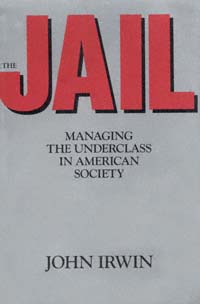 | Title: The jail: managing the underclass in American society Author: Irwin, John 1929- Published: University of California Press, 1985 Subjects: Sociology Similar Items |
| 19. |  | Title: Republic of fear: the politics of modern Iraq Author: Makiya, Kanan Published: University of California Press, 1998 Subjects: Middle Eastern Studies | Politics | Middle Eastern History Publisher's Description: In 1968 a coup d'état brought into power an extraordinary regime in Iraq, one that stood apart from other regimes in the Middle East. Between 1968 and 1980, this new regime, headed by the Arab Ba'th Socialist party, used ruthless repression and relentless organization to transform the way Iraqis think and react to political questions. In just twelve years, a party of a few thousand people grew to include nearly ten percent of the Iraqi population.This book describes the experience of Ba'thism from 1968 to 1980 and analyzes the kind of political authority it engendered, culminating in the personality cult around Saddam Hussein. Fear, the author argues, is at the heart of Ba'thi politics and has become the cement for a genuine authority, however bizarre.Examining Iraqi history in a search for clues to understanding contemporary political affairs, the author illustrates how the quality of Ba'thi pan-Arabism as an ideology, the centrality of the first experience of pan-Arabism in Iraq, and the interaction between the Ba'th and communist parties in Iraq from 1958 to 1968 were crucial in shaping the current regime.Saddam Hussein's decision to launch all-out war against Iran in September 1980 marks the end of the first phase of this re-shaping of modern Iraqi politics. The Iraq-Iran war is a momentous event in its own right, but for Iraq, the author argues, the war diverts dissent against the Ba'thi regime by focusing attention on the specter of an enemy beyond Iraq's borders, thus masking a hidden potential for even greater violence inside Iraq. [brief] Similar Items |
| 20. | 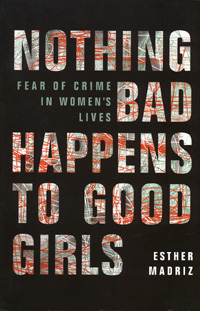 | Title: Nothing bad happens to good girls: fear of crime in women's lives Author: Madriz, Esther 1943- Published: University of California Press, 1997 Subjects: Gender Studies | Sociology | Urban Studies | Women's Studies | Criminology Publisher's Description: "The possibility of being a victim of a crime is ever present on my mind; thinking about it as natural as breathing." - 40-year-old womanThis is a compelling analysis of how women in the United States perceive the threat of crime in their everyday lives and how that perception controls their behavior. Esther Madriz draws on focus groups and in-depth interviews to show the damage that fear can wreak on women of different ages and socioeconomic backgrounds. Although anxiety about crime affects virtually every woman, Madriz shows that race and class position play a role in a woman's sense of vulnerability.Fear of crime has resulted in public demand for stronger and more repressive policies throughout the country. As funds for social programs are cut, Madriz points out, those for more prisons and police are on the increase. She also illustrates how media images of victims - "good" victims aren't culpable, "bad" victims invite trouble - and a tough political stance toward criminals are linked to a general climate of economic uncertainty and conservatism.Madriz argues that fear itself is a strong element in keeping women in subservient and self-limiting social positions. "Policing" themselves, they construct a restricted world that leads to positions of even greater subordination: Being a woman means being vulnerable. Considering the enormous attention given to crime today, including victims' rights and use of public funds, Madriz's informative study is especially timely. [brief] Similar Items |